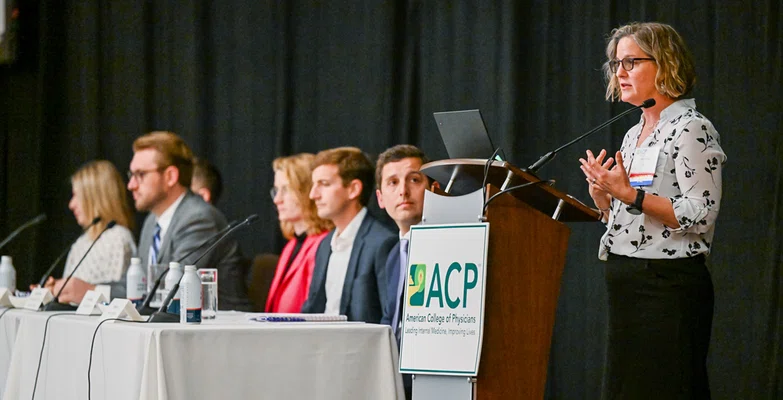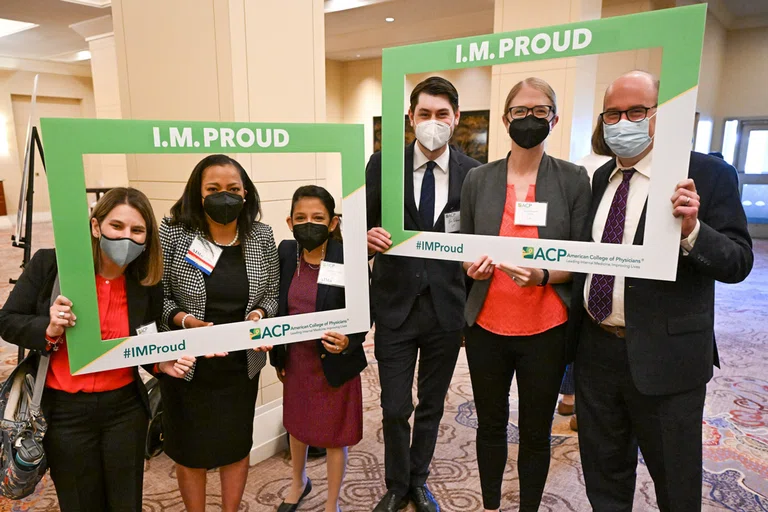


Advocacy in Action
ACP advocates for changes to improve the health care system and daily lives of internal medicine physicians and patients. Through evidence-based policy papers, grass roots efforts, work with congressional leaders, key agencies, regulators, and collaborations with organizations with similar goals, we work to make regulatory and payment systems work better and reduce burnout, increase job satisfaction, and improve patient care.
Leadership Day, May 17-18, 2022,Washington, D.C.
This year, ACP’s advocacy helped:
- Avert Medicare payment cuts scheduled for January 2022 in the Physician Fee Schedule, while also achieving positive gains such as ensuring there would be more time to phase in changes in practice expenses for clinical labor pricing—allowing for a four-year transition period that will help provide payment stability and maintain beneficiary access to care. Additionally, the time has been extended for some services that were added on a temporary basis during the COVID-19 Public Health Emergency (PHE) to the included on the allowed Medicare telehealth services list.
- Encourage choices in the Quality Payment Program’s MIPS Value Pathways (MVPs). Options for 2023 will include four different MVPs that are relevant to internal medicine specialists. One of the included pathways, Optimizing Chronic Disease Management, appears similar to a pathway that ACP previously submitted to CMS for their consideration.
- Implement policy changes recognizing the value of critical care services and appropriately reimbursing for them, including payment rate increases for vaccine administration.
- Extend flexibilities for telehealth services beyond the PHE.
- The announcement from CMS that they will collect data focusing on the impact of health disparities and efforts to increase health equity.
ACP advocacy efforts also succeeded at the federal level including:
- Major improvements to the Public Service Loan Forgiveness Program, which reflect changes that ACP advocated for to enable more people to qualify and have their student loans forgiven.
- Enactment of the Dr. Lorna Breen Health Care Provider Protection Act, which takes steps to help prevent and reduce incidences of suicide, mental health conditions, and substance use disorders among physicians and other clinicians.
- Record numbers of Americans enrolled in health insurance coverage through the ACA marketplaces.
- A New Vision for the Future from the Center for Medicare and Medicaid Innovation (CMMI) that aligns with ACP’s priorities for health care and evaluates more aspects of proposed payment systems such as care delivery transformation, patient outcomes and market characteristics and will also focus on equity.
- Regulations on “ghost guns” to stop the flow of untraceable weapons. ACP has long called attention to the public health threat posed by firearms violence and has called on policymakers to enact laws and regulations that would reduce firearms-related injuries and deaths.
- CMS announced that they will collect data focusing on the impact of health disparities and efforts to increase health equity.
This year ACP released policies with recommendations to improve the practice environment of internal medicine:
- Strengthening Food and Nutrition Security to Promote U.S. Public Health: A Position Paper from the American College of Physicians
- Reforming Physician Payments to Achieve Greater Equity and Value in Value in Health Care
- Financial Profit in Medicine
- Health Care for Our Nation's Veterans
- Beyond the Referral: Principles of Effective, Ongoing Primary and Specialty Care Collaboration
Advocating to Improve Certification Policies and Process
ACP continues to advocate for improvements in certification policies and procedures to meet the needs of internal medicine specialists and subspecialists, improve the value of the certificate for physicians, reduce administrative burdens, and minimize financial burdens.
Most recently, ACP’s advocacy with ABIM’s leaders resulted in an extension for any MOC requirements due in 2020, 2021 or 2022 through 12/31/22, and a hold on all MOC requirements through December of 2021.
ACP’s advocacy also contributed to the launch of the new Longitudinal Knowledge Assessment (LKATM) as an alternative to point-in-time examination. ACP supports physicians enrolled in MOC through MKSAP’s newest feature: the Board Exam Topic Guide, accessed on the home page or from the Learning Plan makes it easy to brush up on high yield content prior to opening LKA questions, find reference text while answering a question, and add topics to a Learning Plan for more detailed review.
Previous Section
${prev-page}
Next Section
${next-page}




